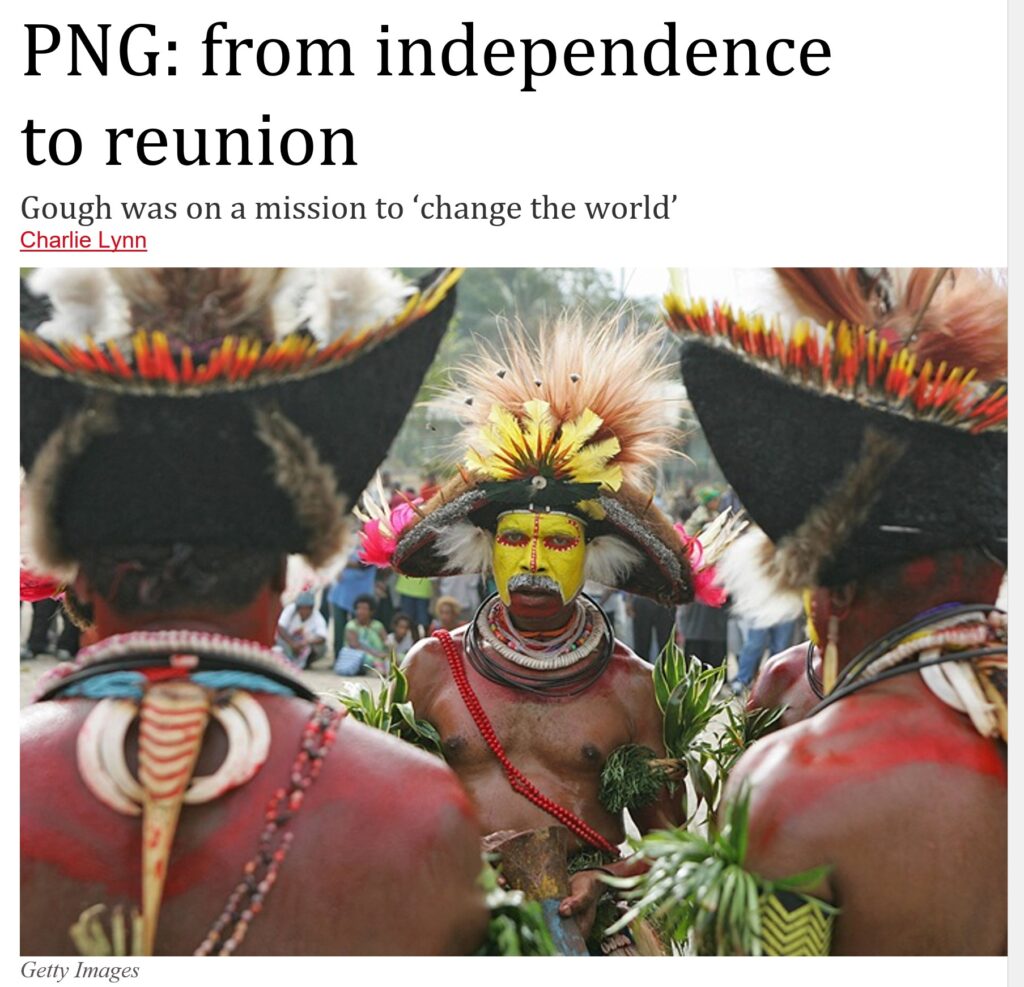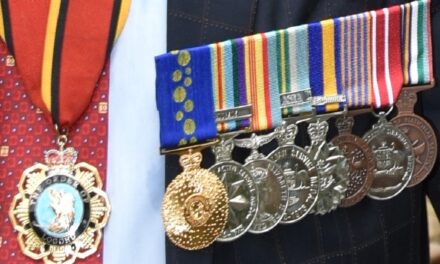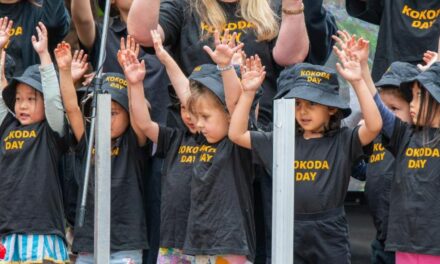
27 May 2025
Fifty years ago, Papua New Guinea was handed independence on a plate by its former self-proclaimed colonial mastas in Canberra.
The date of independence was September 16, 1975.
The movement towards independence came in the early 1970s, after the name Papua New Guinea was officially declared.
A period of self-governance for PNG then followed in 1973.
To set the former Australian territory adrift may have seemed like a good idea at the time.
Papua New Guinea was a land forged on the blood, sweat, and tears of traditional owners, missionaries, explorers, pioneers of business, agriculture, and industry, as well as those who bravely fought to protect our freedom across two world wars.
Under the Whitlam Labor Government, it seemed to be Canberra’s for the giving.
Australian Prime Minister Gough Whitlam was well-known for seeing himself as a ‘visionary leader’. His eloquent and sometimes colourful speeches often reflected his self-determination.
The Whitlam Institute, which helps to deify all things Gough Whitlam, recounts an early meeting of the future first Prime Minister of Papua New Guinea, Michael Somare, with Gough.
‘In 1969, when visiting the Papua New Guinea village of Wewak, Whitlam was confronted by a young secretary from a local trade union, Michael Somare. When Somare asked boldly when Australia would give Papua New Guinea its independence, Whitlam responded: How about tomorrow?’
Whitlam had found his ‘perfect partner in crime’ in Somare – ‘a young secretary from a local trade union’.
At the Independence Ceremony held in Port Moresby, Whitlam said: ‘Australia could never be truly free until Papua New Guinea was truly free. In a very real sense, this is a day of liberation for Australia as much for Papua New Guinea.’
Whitlam had previously described Australia’s ‘colonial’ rule over Papua New Guinea as ‘wrong and unnatural’.
This is a scene we see so often played out in Canberra where grandiose schemes are hatched and launched post-haste because elected governments – and the egos of elected leaders – have a use-by date of only three years to guarantee a few lines, or maybe a chapter, in the annals of history.
The Whitlam government set a cracking pace and wasted no time in passing an all-time record of 203 bills in its first year alone, amassing 508 bills before it was ousted in November 1975.
Gough was on a mission to ‘change the world’.
The Australian taxpayer has to inevitably pay the price for this kind of ego-tripping extravagance in Canberra.
The most recent glaring example is the well-intentioned, poorly conceived, ill-fated, ultimately divisive, and outrageously expensive 2023 Voice Referendum with its $450 million price tag.
The only positive outcome of the Voice Referendum is that we now have a benchmark as to how hopelessly out of touch Canberra is with the rest of Australia.
PNG’s independence was unconstitutional
The 2023 Voice referendum in Australia was one we didn’t need.
However, in the early 70s, a referendum on the Independence of Papua New Guinea was one we actually needed by virtue of the Australian Constitution.
According to the Australian Government Parliamentary Education Office:
‘The Australian Constitution does not contemplate any state or territory leaving Australia. The only legal path to secession would be by a national referendum.’
So, why didn’t the Whitlam government conduct a referendum on the proposed Independence of Papua New Guinea?
A referendum would have been a pathway to lively and constructive debate.
Many of the issues we see festering today in Papua New Guinea would have been given the opportunity for public discussion and opinion. We live in a democracy, after all.
By the 1970s, and dating back to 1906, Australia had conducted 26 referendums on a variety of issues from trade and commerce to communism and Aboriginals.
During the 1970s, there were no fewer than 10 referendums conducted, including a referendum on referendums in 1977!
A referendum is the only collective ‘voice’ Australian citizens have, as we are so hopelessly misled and let down by our elected leaders in Canberra.
Yet, it appears that Papua New Guinea’s Independence was a topic not worthy of a referendum.
Papua New Guinea was Gough Whitlam’s pet project, his gift to the world. The Labor Party’s apology for Australia being Australia.
Papua New Guinea’s independence was ‘Woke’ before ‘Wokism’ was a thing!
Had a referendum been conducted, public debate would have run along similar lines to the Voice.
Why are we ashamed to be Australian?
What’s wrong with being part of Australia anyway?
Over 8,000 young Australian lives were lost during the second world war in Papua New Guinea.
Why should we abandon their sacrifice?
Yes, Papua New Guinea has always been a challenging environment. But independence has done absolutely nothing to fix it. If anything, it has made matters worse.
Most of the issues we see in PNG today were festering 50 years ago. The Bougainville crisis arose from issues before independence.
Canberra’s strategy may well have been to portray (betray) Australia as a ‘colonialist’ to gain support for independence within Papua New Guinea.
However, had Papua New Guinea remained part of Australia, it would be as much a colony as the Northern Territory and the Australian Capital Territory are today!
It was the Whitlam government’s Woke independence rhetoric that branded PNG a colony and Australia a colonialist – mud that still sticks 50 years later.
The view from within
Within Papua New Guinea, there was a firm belief before independence that the territory was not ready for nationhood, if at all.
One of the main exponents of this line of thinking was Tei Abal.
According to Wikipedia:
Abal initially formed the Compass Party and then became the first leader of the Highlander-dominated United Party (UP), which won more seats than any other party at the 1972 election. Consequently, he was expected to become chief minister following the introduction of self-government in December 1973. Instead, Pangu Pati’s Michael Somare negotiated a national coalition and formed an administration.
To some, this was the beginning of the rot and corruption we see today in PNG politics. A man voted for by the people, politically undone.
With this act, there was no chance of a referendum or consultation with the people of Papua New Guinea over the issue of independence.
The future of Australia’s relationship with Papua New Guinea, and vice versa, was now solely in the hands of Whitlam and Somare.
Reunion Day
The 50th year of Papua New Guinea’s independence may provide a good opportunity for renewed discussion around the events of 1975.
As Canberra seeks greater influence within PNG in the face of a mounting presence by China and now with Russia in the region, it may be timely to admit to the Constitutional oversight of the Whitlam government and have an open and honest bilateral discussion on PNG’s independence.
Perhaps a long-overdue referendum, 50 years in the making, involving the people of Australia and Papua New Guinea.
Let’s face it: with PNG’s dependence on foreign aid, the country will never be truly independent anyway. Using Canberra’s logic, the shift has gone from colonialist to neo-colonialist.
There are also many, on both sides of the border, who would welcome a closer relationship between PNG and the real Australia (not the one spruiked by Canberra).
It would make life more hopeful for so many Papua New Guineans to have their territory reunited with, part of, contributing to, and growing with the greatest country on earth.
Something more meaningful than a national team in a foreign rugby league competition.
Australia to Papua New Guinea: ‘Mate, where the bloody hell have you been?’
You should never have left.
Charlie Lynn is a former Liberal Member of the NSW Parliament during which time he established Parliament Friends of PNG Association. He has led 100 treks across the Kokoda Trail since 1991 and established two foundations to provide philanthropic support and has made representations to the Australian Senate in support of access for PNG citizens to Australian farms for seasonal work. In 2015 he was inducted as an Officer of Logohu in the PNG Honours List ‘for service to the bilateral relations between Papua New Guinea and Australia and especially in the development of the Kokoda Trail and its honoured place in the history of both nations’ over the past 25 years’.




